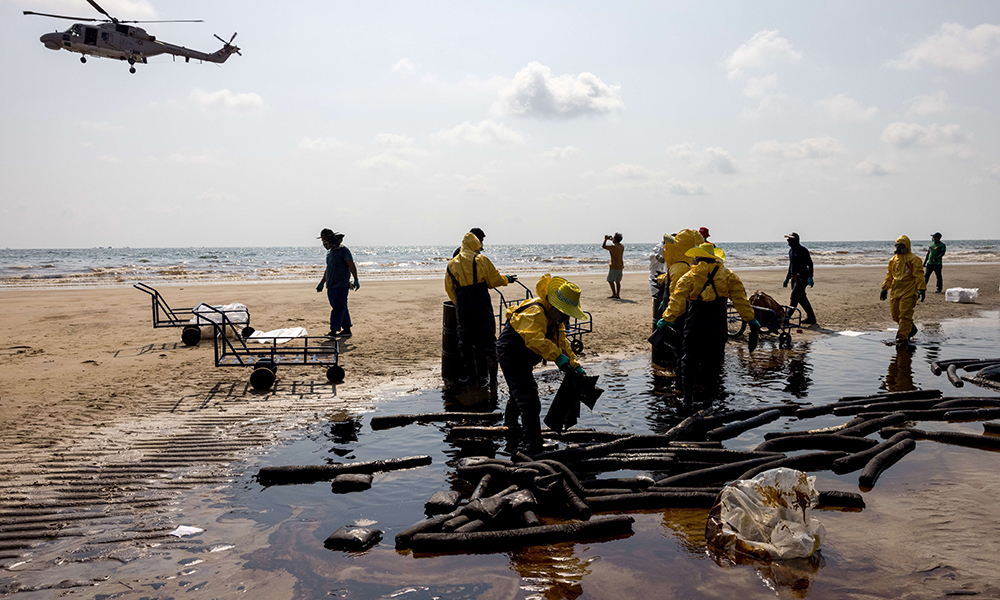RAYONG, Thailand: The nightly armada of bobbing green lights from squid boats has all but disappeared near the site of an oil spill in the Gulf of Thailand, as devastated local crews brace for lost income and damaged fish stocks. The Thai navy is scrambling to clean up Tuesday night’s spill from a pipeline that leaked at least 60 tons of crude oil 20 kilometers (12 miles) off the coast of Rayong province. Authorities have declared Mae Ram Phueng Beach a disaster zone and closed it to swimmers as crews in yellow plastic protective suits begin the clean-up. Rayong resorts and seafood restaurants say the spill is a “nail in the coffin” for their businesses after the tourism industry’s continued pandemic downturn. For long-time fishermen who have been asked to halt their catches for at least a month in exchange for emergency payments, there is a feeling of deja vu.
They recall the long road to environmental and economic recovery after another pipeline leak in the same area in 2013. Initial compensation for that accident was around $900, but fisherman Tuem 46, says it is no substitute for regular work. “I don’t want compensation. I want a healthy sea that I can work in for my livelihood,” he said. “The sea can give us money every day. The sea was good in the past few years. I do not know how many years before it becomes good again.”
Five-year recovery
Tuem usually makes around $30 a day from a 7-10 kilogram (15-22 pound) haul but he says now he will struggle to cover the cost of petrol to retrieve his fishing nets. “The impact is immediate and clear. I do not know what to do,” he said. AFP joined a group of fisherman on a boat trip Sunday — their fishing haul amounted to about 10 percent of their usual catch and many fish were dead. Burapha University marine scientist Thanomsak Boonphakdee, who was taking water samples at the beach over the weekend, says it will take a long time to fully assess environmental damage from the disaster.
The marine life took at least five years to recover from the 2013 incident, he said. “Crabs, small fish and shrimp are the (creatures) that will be affected most,” he told AFP. A dozen ships are spraying dispersant chemicals and so far more than 80,000 liters (21,000 US gallons) has been doused over the affected area. Star Petroleum Refining Public Company Limited, the operator of the pipeline and whose major shareholder is US giant Chevron, said it was trying to minimize the slick’s ecological impact using booms. But satellite imagery shows the slick had already spread to an area of 51 square kilometers (20 square miles) on Sunday, local media reported. There are also fears a national park on the island of Ko Samet will be affected and Thai authorities Sunday deployed absorbent material to Ao Prao beach as a precaution.
Transparency calls
Natural Resources and Environment Minister Varawut Silpa-archa urged oil companies in Thailand to ramp up prevention measures and boost inspections and maintenance programs on land and sea. “I do not want this kind of accident to happen again. The expense of spending money to solve a major disaster after it happened, cannot compare with companies increasing the inspections,” he told reporters in Rayong.
Greenpeace, which has called on the Thai government to set up an independent investigation into the spill, said incidents are becoming far too common. Between 1974 and present day there have been 240 oil spill incidents in Thailand, the environmental group said. “The oil spill will affect marine life and could be fatal for fish, shrimps, shellfish,” Greenpeace warned. Another fisherwoman, Nid, 62, lamented it was heartbreaking to see another disaster after seeing the area’s recovery in recent years. “We are just small insects who have no voice to be heard,” she said. — AFP











